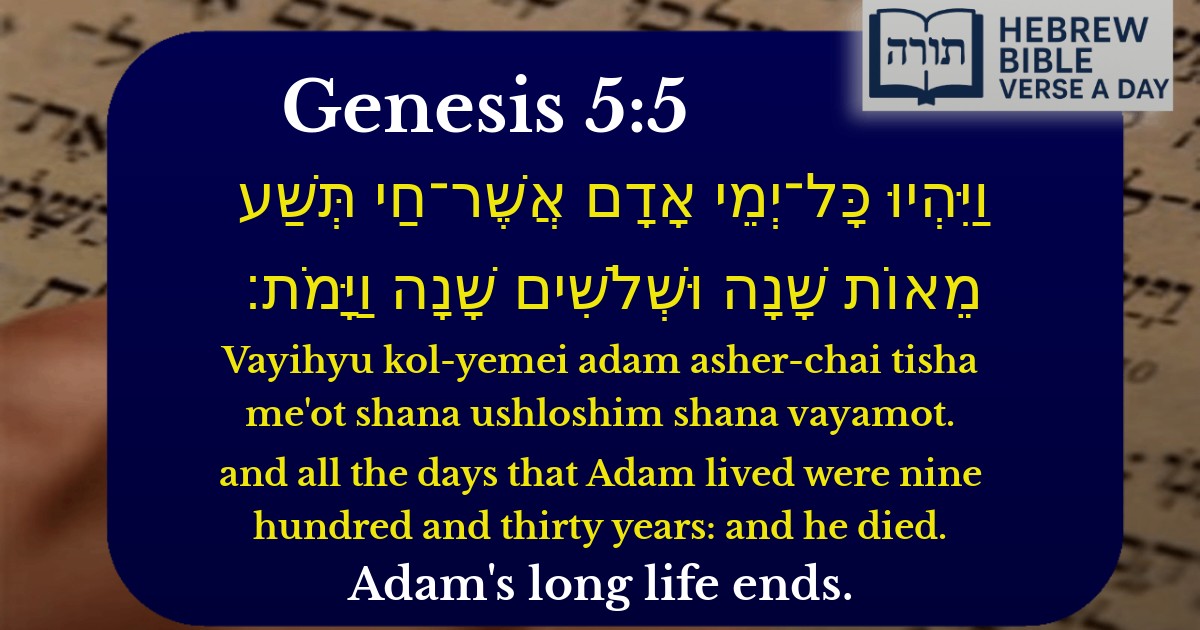Join Our Newsletter To Be Informed When New Videos Are Posted
Join the thousands of fellow Studends who rely on our videos to learn how to read the bible in Hebrew for free!
Hebrew Text
וַיִּהְיוּ כָּל־יְמֵי אָדָם אֲשֶׁר־חַי תְּשַׁע מֵאוֹת שָׁנָה וּשְׁלֹשִׁים שָׁנָה וַיָּמֹת׃
English Translation
and all the days that Adam lived were nine hundred and thirty years: and he died.
Transliteration
Vayihyu kol-yemei adam asher-chai tisha me'ot shana ushloshim shana vayamot.
Hebrew Leining Text
וַיִּֽהְי֞וּ כׇּל־יְמֵ֤י אָדָם֙ אֲשֶׁר־חַ֔י תְּשַׁ֤ע מֵאוֹת֙ שָׁנָ֔ה וּשְׁלֹשִׁ֖ים שָׁנָ֑ה וַיָּמֹֽת׃ <span class="mam-spi-samekh">{ס}</span>
וַיִּֽהְי֞וּ כׇּל־יְמֵ֤י אָדָם֙ אֲשֶׁר־חַ֔י תְּשַׁ֤ע מֵאוֹת֙ שָׁנָ֔ה וּשְׁלֹשִׁ֖ים שָׁנָ֑ה וַיָּמֹֽת׃ {ס}
🎵 Listen to leining
Parasha Commentary
📚 Talmud Citations
This verse is quoted in the Talmud.
📖 Sanhedrin 38b
The verse is referenced in a discussion about the lifespan of Adam and the generations before the flood.
📖 Eruvin 18b
Mentioned in the context of discussing the creation of Adam and his lifespan.


Longevity of Adam in the Torah
The verse states that Adam lived for 930 years before his death. This extraordinary lifespan is addressed by several Orthodox Jewish commentators, who provide insights into its significance.
Rashi's Explanation
Rashi (Bereshit 5:5) notes that Adam was originally destined to live 1,000 years, but he forfeited 70 years of his life. According to Midrash (Pirkei DeRabbi Eliezer 19), Adam gave these 70 years to King David, who was destined to die at birth but was granted a full lifespan of 70 years (Tehillim 90:10). This teaches the concept of zechut avot (merit of the forefathers) and divine providence in allocating lifespans.
Rambam's Perspective on Longevity
Rambam (Moreh Nevuchim 2:47) explains that the extended lifespans of early generations reflect a different natural order before the Flood. The world was closer to its original, perfected state, and human physiology was more resilient. After the Flood, lifespans gradually decreased (as seen in the genealogies of Bereshit 11), reflecting the physical and spiritual decline of humanity.
Kabbalistic Interpretation
The Zohar (Bereshit 55a) teaches that Adam's long life represents the 930 years he needed to rectify the damage caused by the sin of the Tree of Knowledge. His death before reaching 1,000 years (a complete divine number) signifies that full rectification (tikkun) was not achieved in his lifetime, leaving the remaining 70 years for future generations to complete.
Moral Lesson from Adam's Death
The Talmud (Sanhedrin 38b) emphasizes that Adam's death serves as a reminder of human mortality and the consequences of sin. Despite his lofty spiritual stature, Adam was subject to the divine decree of mortality (Bereshit 3:19). This teaches humility and the importance of repentance, as even the first human could not escape the ultimate judgment.